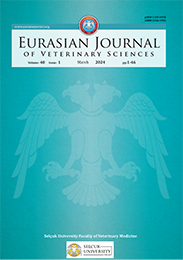| 2024, Cilt 40, Sayı 2, Sayfa(lar) 058-065 |
| [ Türkçe Özet ] [ PDF ] [ Benzer Makaleler ] |
| Effect of Ergothineine and Quercetin Additions in to the In Vitro Embriyo Development |
| Mustafa Bodu1, Ali Erdem Ozturk2, Murat Elcin3, Yunus Emre Atay4, Salih Narlicay5, Mehmet Bozkurt Ataman1, Mustafa Numan Bucak1 |
| 1Selcuk University, Faculty of Veterinary Medicine, Department of Reproduction and Artificial Insemination, Konya, Türkiye 2Erciyes University, Faculty of Veterinary Medicine, Department of Reproduction and Artificial Insemination, Kayseri, Türkiye 3Selcuk University, Faculty of Veterinary Medicine, Konya,Türkiye 4Erciyes University, Faculty of Veterinary Medicine, Department of Obstreics and Gynecology, Kayseri, Türkiye 5Sivas Cumhuriyet University, Faculty of Veterinary Medicine, Department of Reproduction and Artificial Insemination, Sivas, Türkiye |
| Keywords: Embryo, in vitro fertilization, L-ergothioneine, quercetin www.eurasianjvetsci.org Eurasian |
| Downloaded:98 - Viewed: 450 |
|
Aim: This study aimed to investigate the effects of ergothioneine and
quercetin on the in vitro development of bovine embryos.
Materials and Methods: Cumulus-oocyte complexes (COCs) were collected via ovary aspiration from a local abattoir and cultured in vitro for maturation. After maturation, in vitro fertilization was performed. The pronuclear embryos were divided into three groups: control, 10 ?M L-ergothioneine, and 10 ?M quercetin supplemented. After the addition of antioxidants to the CR1aa medium, in vitro culture of embryos were performed. The cleavage and morula rates were assessed on days 2 and 5, respectively. Blastocyst formation and quality were assessed on days 7-8. Results: Statistical analysis showed cleavage and morula rates were significantly higher in the ergothioneine group compared to the quercetin and control groups (P<0.05). While no blastocysts formed in the quercetin group, the blastocyst rate reached to 17.96% with ergothioneine supplementation on day 8. Conclusion: In conclusion, supplementation with 10 ?M ergothioneine enhanced the in vitro development of bovine oocytes. However, 10 ?M quercetin supplementation impaired development, and no blastocyst formation observed. Further studies utilizing different concentrations are warranted to better understand the effects. This study provides insights into modulating oxidative stress during in vitro embryonic production. |
| [ Türkçe Özet ] [ PDF ] [ Benzer Makaleler ] |




